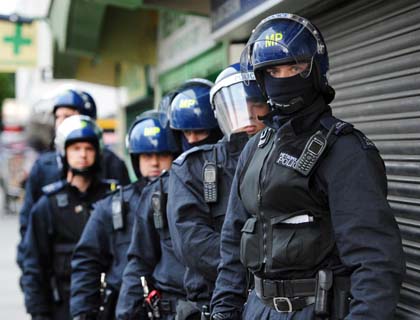The recent riots and economic terrorism in the streets of Britain and the way it was tackled raised many question about the performance and credibility of the police department and its intelligence unites. During violence and disorder, Britain's police officers were in trouble and failed to protect public and government properties across the country. Though factors behind these riots are numerous, but the most concerning developments in the UK political and social relations have been the emergence of racism, discrimination, Islamofobia and prevailing criminal culture in recent years.
The issues of burning the holy Quran, derogatory cartoons of Prophet Muhammad, religious dress, Burkha, the issue of Halal and Haram food and the acts of terrorism by some Muslim extremist groups in and outside the UK created a lot of misunderstanding among the followers of different faiths.
Another development that taken place just recently is the troubled relationship between cultural diversity. No doubt, there has been progress on race relations in the past, but racism continues to blight many lives. There has been the lake of optimistic concept of integrated society in the country.
The threat to the national security is not only emanating from Scottish, Welsh and Irish nationalism, multiculturalism has placed communities against each other. In the absence of a sophisticated and political response to cultural diversity and plurality, many white and black issues remained untouched. Black and Asian complain they are not treated equally, while whites say their country's citizenship has been contaminated.
Mark Perryman's (2009) views the issue from different perspective: "....debates about Welsh, Scottish, Irish or English identity were conducted in isolation from the multicultural question. Britain's broad pattern of allegiance within, across and between, was lost in the homogenising tendency of nation building..........however, it is clear a new discourse of multiculturalism is required."
Multiculturalism in Britain failed and saved no life. Those involved in terror related incidents and recent riots in the country, came from different cultures, races and religions. Though, the doctrine of multiculturalism inculcates us that communities-should not be forced to integrate, but recently this idea has come under attack while minorities are going in isolation.
In Yasmin Alibhai-Brown (Telegraph 23 May, 2000) understanding, black people now retreating into tribal identities instead thinking of themselves. They demand attention and resources for their particular patch. In her well-researched article, Brown has revealed that: "The English are understandably disgruntled that their ethnicity is denied while all other identities - Welsh, Scottish, Hindu, Caribbean and the rest - are celebrated."
The issue of racism in the police department badly affected the professional abilities of the force. Last year, Equality and Human Rights Commission in its report concluded that Metropolitan Police was responsible for 120,000 'excessive' stops and search against people from ethnic minorities in 2008 and 2009. On 25 August 2011, daily Mail reported an independent inquiry into aspects of alleged racism in the Metropolitan Police department.
Sir Bill Morris was request to carry out an investigation into the racist behaviour of officers. The investigation found cases, specifically, of Superintendent Ali Dizai and Officer Sergeant Gurpal Singh Virdi who was sacked after being falsely accused of sending hate mail. On April 29, 2011, daily Mail reported a lady police constable Hina Parekh resigned over her racist abuse and bullying in the Metropolitan Police. Hinah Parekh said her racist abuse from fellow police officers suffered her from depression and stress.
Reform process in the police department and cleaning up the institution from unionists and political interference is another challenge. According to former UK police chief that politics in the policing needs to be investigated. Though, number of attempt for the modernisation of the police, their integrated technology, skills and training, and re-balancing the criminal justice system were made in the past, but positive change in the police way of fighting criminal gangs never occurred.
Home Affairs Select Committee recently completed some inquiries into policing in the UK and focussed on what is likely to be the key element of the reforms. The committee finally published a comprehensive police and crime commissioners report in Dec 2010 and recommended that relations between the Chief Constables and elected Police and Crime Commissioners. In recent riots, cold war between the police and government authorities in various cities remained irksome.
Home Secretary criticised the police chiefs for their handling of the violence while Police officers rebutted the Prime Minister decision to hire a former New York and LA police chief as an adviser in the wake of the riots. Another issue that widened clefts between the police and government is the row over police funding and the need to surge so many officers onto the streets. The police clearly feel aggrieved that they have been criticised for the way they handled the riots.
Though Home Office in its recent report (Equality, Diversity and Human Rights Strategy for the Police Service) has claimed that policing has undergone transformation over the recent years and it has positively responded to the changes in society, but the recent riots proved that police and its intelligence unites are still not able to tackle a major unrest across the country.
Home Office, Association of Chief Police Officers and Association of Police authorities with the support of National policing Improvement Agency have the responsibility to closely monitor racism and discrimination in the police department. But how they are monitoring it, is the main question. There is no change in the police behaviour in treating people in the police stations and streets.
If the Home Office and NPIA report on equality and diversity of the police and their monitoring policy in response to a number of reviews of the Bradley Report (2009), the Independent Police Complaints Authority Report (2008), the Commission for Racial Equality's (CRE) Formal Investigation into the Police Service (2003) and the Stephen Lawrence Enquiry Report (1999)" during the last ten years is fully implemented then we can expect there will be improvement in the performance of the UK police.

